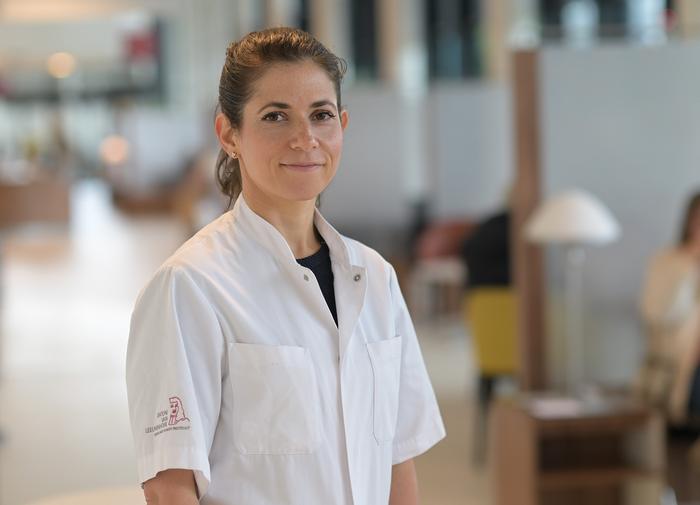A short course of immunotherapy was found to be highly effective in a subset of patients with colon cancer. The treatment, which consisted of two cycles of immunotherapy prior to surgery, was effective in almost all patients. In two third of patients, there were no longer any live tumor cells at the time of surgery. The patients’ immune system had cleaned up the cancer cells. These groundbreaking discoveries were made as part of the NICHE-2 trial at the Netherlands Cancer Institute and have been published in the New England Journal of Medicine.

Credit: Andre Jagt, Netherlands Cancer Institute
A short course of immunotherapy was found to be highly effective in a subset of patients with colon cancer. The treatment, which consisted of two cycles of immunotherapy prior to surgery, was effective in almost all patients. In two third of patients, there were no longer any live tumor cells at the time of surgery. The patients’ immune system had cleaned up the cancer cells. These groundbreaking discoveries were made as part of the NICHE-2 trial at the Netherlands Cancer Institute and have been published in the New England Journal of Medicine.
Patients with colon cancer with a specific genetic makeup, known as mismatch-repair deficient (dMMR) or microsatellite instable (MSI) were treated with one cycle of ipilimumab and two cycles of nivolumab. In 95% of patients, the tumor was either complete or almost completely gone, which was measured as 10% or less cancer cells found at the time of surgery. In 68% of patients there were no live cancer cells.“This specific type of colorectal cancer contains a high number of DNA errors, which means that the tumor cells are more easily detected by the immune system. The immune system only requires a small incentive to successfully target the tumor cells,” Chalabi says to explain the success of the treatment. Equally important, none of the patients had developed metastases in the average of two years that they have been followed so far.
The first signs of success were observed quite early on after medical oncologist Myriam Chalabi initiated the NICHE trial. Chalabi: “We wanted to investigate what immunotherapy could do for people with non-metastatic colon cancer. We witnessed something that rarely ever happens: every single patient in the study responded well to the new treatment.” Four years ago, Chalabi and her colleagues published the results of the trial involving the initial 20 patients with this type of colorectal cancer. “Back then we had treated 20 patients with mismatch-repair deficient tumors, and all had benefited from the treatment. We had never seen anything like it and knew that if we could show this in a larger group of patients, this treatment could be a game-changer.” That led to the development of NICHE-2, the current study that was published.
|
Neoadjuvant immunotherapy Immunotherapy given before surgery is known as neoadjuvant immunotherapy. It is intended to prevent cancer from spreading or returning, and in case of larger tumors, to make surgery easier. The main idea behind treating before surgery is that the immune system can interact with more tumor cells and more of the DNA errors that these tumors have, as well as more immune cells, which makes it more effective in attacking the cancer cells. |
Unprecedented results
Chalabi: “Now, more than two years after treatment, none of the patients saw recurrence even though many had high-risk tumors. The results are unprecedented. The efficacy as well as the side-effects are much better compared to chemotherapy before surgery, a treatment that only works in 1 out of 20 patients.”
In the clinic
In the Netherlands, the studied treatment is not yet available for patients. “This trial is intended to make this treatment available to patients with this type of colorectal cancer. Towards the end of the year, we will have followed these patients for three years. If the majority of these patients is still cancer-free, we should work towards making this therapy a standard treatment option.”
“We have reached the point where we can forgo chemotherapy before surgery in this and comparable studies in patients with colorectal cancer who respond well to neoadjuvant immunotherapy. The next and crucial step is to make this treatment available as a standard treatment. That is what we are currently working towards. And eventually we hope to even provide the option of avoiding surgery in patients who respond well.”
Standing ovation
Two years ago, Chalabi presented the preliminary results at a large international congress. She was awarded with a standing ovation for her work, and the #Chalabiplot phenomenon on X (formerly known as Twitter). This refers to a graph she showed in her presentation, visualizing the impressive results of the trial. “Thinking back to that moment still gives me goosebumps. The positive emotions in the hall were palpable: these results could drastically improve the treatment outcomes of future patients.”
This graph shows the decrease in tumor as measured by the pathologist after surgery. Every bar depicts an individual patient, and when the bar reaches -100 it means that the tumor was completely gone. MPR stands for major pathologic response, which is the boundary of 10% or less live tumor cells.
Journal
New England Journal of Medicine
Method of Research
Randomized controlled/clinical trial
Subject of Research
People
Article Title
Neoadjuvant immunotherapy in locally advanced dMMR colon cancer
Article Publication Date
5-Jun-2024
Discover more from Science
Subscribe to get the latest posts sent to your email.


